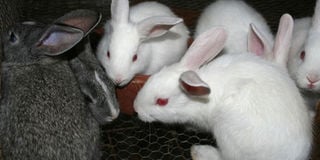Japanese agency to fund rabbit farmers' training in Nyeri, Machakos

The Japanese International Co-operation Agency and the Jomo Kenyatta University of Agriculture and Technology have launched a project to train farmers on commercial rabbit rearing. PHOTO | JACOB OWITI | FILE
What you need to know:
- The pilot project being spearheaded by Jomo Kenyatta University of Agriculture and Technology (JKUAT) has selected Nyeri and Machakos counties as prototypes counties
The Japanese International Co-operation Agency (JICA) has rolled out a Sh25 million fund to facilitate farmers’ training on commercial rabbit rearing.
The pilot project being spearheaded by Jomo Kenyatta University of Agriculture and Technology (JKUAT) has selected Nyeri and Machakos counties as prototypes counties.
According to JKUAT Deputy Vice Chancellor in charge of Research, Production and Extension, Prof Esther Murugi Kahangi, the project would be rolled out in other counties once its viability is ascertained.
She said a private firm, The Rabbit Republic Limited, has been contracted to undertake training of the farmers, the majority of whom are women, on the best practices to meet the soaring demand for rabbit products.
“This project is one of the many which is annually funded by JICA to see hundreds of farmers trained on the best practices that is aimed at making rabbit farming a viable commercial undertaking.
“There is an up-surging demand for not only rabbit meat but other products like skin in the world and the market is soaring,” Ms Kahangi said.
The professor noted that over 10,000 women through JICA have received full training on the subject over a decade now.
According to the Founder and Chairman of The Rabbit Republic Moses Wambua Mutua, it is time Kenyans take rabbit farming seriously adding that it is a sector that require little space and time but provides mammoth returns. He said they are out to mobilize and sensitize potential investors on commercial rabbit production.
Mr Mutua said they have a whole network across the country and are soon expanding to Uganda and Tanzania with skin having a bigger market.
“We are set to work with these farmers through a five year contract by offering them a guaranteed market. We buy in live weight; for instance a kilo going for Sh400 and five kilograms at Sh2,000.”
We tan the skin at Sh250 a piece which is very tender, soft and strong hence fetching more returns. Rabbit urine is also being used in laboratories in growth of micro bacteria for research,” Mr Mutua said.
The company has a farmer base of over 500 farmers.





